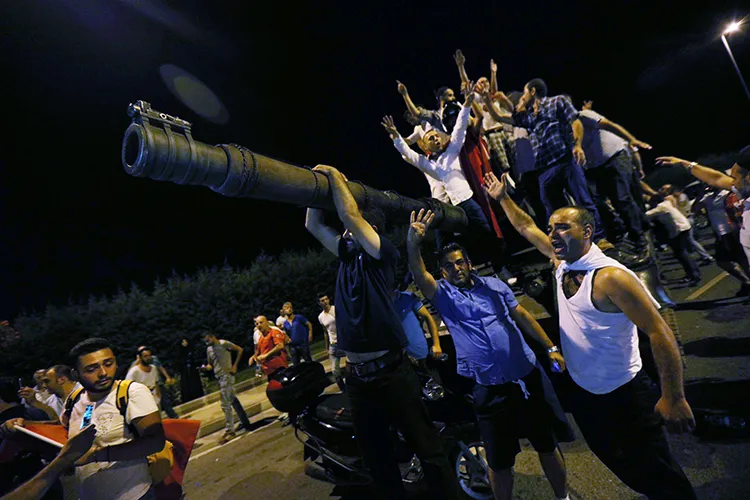The history of modern Turkish politics is rife with military intervention–the army has toppled elected governments four times since Mustafa Kemal Atatürk founded the modern Turkish state in 1923, and has strong-armed them into submission countless other times. One of President Recep Tayyip Erdoğan’s greatest accomplishments has been returning the military to the barracks and diminishing its influence in public life. But last year, on July 15, a rogue segment of the Turkish Armed Forces tried and failed to overthrow the government of the ruling Justice and Development Party (AKP).
Parties from across Turkey’s political spectrum condemned the treacherous act. Even the fiercest critics of the AKP defended the elected government. For a brief time at least, Turkey was a country united. A grand rally in Istanbul, attended by many political parties, gave those who attended hope that the coup attempt, traumatic as it was, might have brought a polarized country together. That hope was soon dashed.
Having lived through similar experiences, Turks know what to expect after a coup d’état or an attempted coup: limitations on rights and freedoms; government control of the news media; an extended state of emergency; mass arrests; courts, laws, and decrees to legalize the government’s directives; nationalist rhetoric conflating criticism with treason; fear.
The past year has been no exception. At the end of last year, Turkey jailed more journalists than any other country had in any year since the Committee to Protect Journalists began keeping records in the early 1990s. The government purged the police, the judiciary, academic, and government institutions. The Turkish news media were hollowed out. More than 100 outlets were closed. Journalists were jailed or pushed into exile to avoid retaliation for their work. Hundreds of media workers were left unemployed. Pro-Kurdish media was almost entirely decimated. Any media outlet accused of any affiliation with the movement of exiled preacher Fethullah Gülen–whom the Turkish government accuses of being the mastermind of the coup attempt–was closed. Small leftist publications were closed.
Ceren Sözeri, an associate professor at Galatasaray University’s Faculty of Communication, told CPJ that a key outcome of this purge has been “omnipresent self-censorship.” She said journalists face a daily dilemma: Will publishing this article result in prosecution, arrest, or worse? Is running this story worth the risk?
While online media, including social media platforms, have filled some of the gap left by the shuttering of traditional outlets, “The Internet is still the news source of the young,” Erkan Saka, an associate professor at Bilgi University’s Department of Communication Design and Management, told CPJ. Older Turks, and those in the countryside especially, depend on TV and radio.
The purge has affected the flow of information to the public.
“News on corruption has significantly diminished,” Sözeri said. “It has become very hard for journalists to reach sources.”
Sözeri says that while it is still possible to report on financial wrongdoing in private businesses, coverage of government corruption has all but stopped because of journalists’ fear. And if pro-opposition commentators are allowed to speak in the mainstream media, even if briefly, pro-government commentators quickly shout over them.
A year after the coup attempt, the government continues to rule by emergency decree. Constitutional amendments narrowly passed in a referendum bestowed the president with sweeping new powers. Having won the referendum, the president has shown no interest in easing the media crackdown. Instead he has justified anti-press actions as targeting not journalists but criminals and terrorists.
“There is no difference between a person who pens headlines and newspaper articles under a terrorist organization’s order and one who arms himself and goes into the mountains to engage in an armed conflict,” Erdoğan said while addressing a group of media representatives, the pro-government Daily Sabah reported on June 18, 2017.
As the editor of the leftist daily newspaper Evrensel, Fatih Polat is in the lonely and uncomfortable position of shepherding one of the few independent news sources left through dangerous waters.
“Turkey has a unique place in the world thanks to the number of the imprisoned journalists and the unending press trials that haunt us like a nightmare,” he told CPJ. “We live with the worry that we can be shuttered by a government decree at any moment. How do we continue with our Plan B to continue with a new newspaper if we are shuttered? What will we do for a Plan C, if that newspaper is also shuttered? We think about these questions all the time.”
While the international limelight has been on jailed journalists and those forced into exile, one devastating side effect of the crackdown in Turkey is the vast unemployment of those who worked in the news media. According to Turkish media groups, hundreds of journalists have lost their jobs in the crackdown and have been unable to find work because their experience brands them as potential traitors or terrorists.
An editor who lost her job at a mainstream national daily newspaper, who spoke on the condition of anonymity for fear of repercussions for her or her family, told CPJ that she sees no point in looking for a journalism job in Turkey today and now works as a corporate copywriter.
“There is no media left in Turkey,” she said. “I did not look for a job in journalism because there is no way to do genuine reporting when a single voice is dominant, when ties to reality have been completely severed.” Much of Turkish journalism now is “nationalist fiction,” she said.
